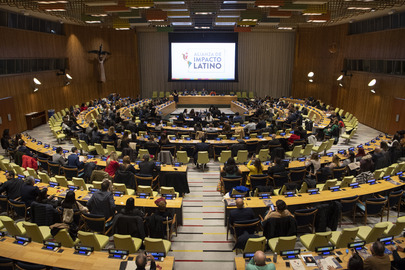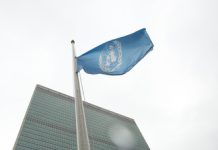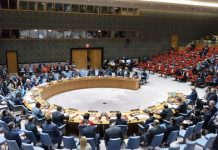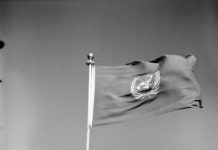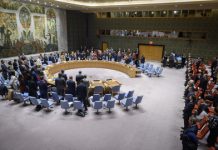Attacks against health facilities doubled between 2023 and 2024, and more than 900 health workers were killed last year, the agency reported.
Humanitarian aid workers were also killed in record numbers in 2024. Yet, 2025 is outpacing even these dark statistics at a time when funding for humanitarian work is shrinking and support services established over decades are struggling to operate.
The Special Surgery Building at Al-Shifa Medical Complex in central Gaza City has been reduced to rubble.
Assault on Gaza’s health system
The nearly two-year-long war has devastated Gaza’s health system, leaving thousands without access to essential services. Now, as famine takes hold, miscarriages, premature births and low birth weight cases have surged, while newborn deaths are increasing, the UN agency warned.
PULL QUOTE: Life must continue even when bombs are going off.
“Because the delivery room was under direct fire, I delivered babies in hospital hallways,” said Ayda, a senior midwife in northern Gaza. “For lights, we used mobile phones. Despite the lack of supplies and water, our hands continued to work. Life must continue even when bombs are going off.”
Since October 2023, the World Health Organization (WHO) has documented over 720 attacks on healthcare in Gaza, with at least 1,580 health workers killed and as yet unknown numbers arrested and detained by Israel. Among them was Ayda, who just days after sharing her story, was killed in an airstrike along with 37 members of her family.
Dr. Khalid Badreldin completed his studies at the Ibrahim Malik Hospital in Khartoum, which now lays in ruins.
Delivering amid devastation in Sudan
In a field of rubble that used to be part of the Ibrahim Malik Hospital in Khartoum, Dr. Khalid Badreldin, a reproductive health analyst with UNFPA in Sudan, recalled performing his first surgery and delivering his first baby there.
“Now, I find it like this,” he said, lamenting the now shuttered hospital that was once a major provider of emergency treatment and maternal and neonatal services. The hospital has joined more than 80 per cent of health facilities in Sudan’s conflict zones that are no longer operational.
Meanwhile, midwives in Khartoum, the capital, are taking “huge risks to reach women in their homes”, explained Hawaa Ismael, who works at the UNFPA-supported Kararai Health Centre.
“It was exhausting, working day and night, but it’s our duty, and I’m proud of what we’ve done.”
On the other side of the country, staff at the El Fasher Maternity Hospital have come under attack, with one midwife killed when her home was shelled on Thursday and another kidnapped.
Haiti’s spiralling crisis
Clinics and hospitals have been deliberately targeted in the crisis that has gripped Haiti over the past 18 months, further weakening a health system already hobbled after years of conflict, looting and financial collapse.
In Haiti, people carrying their belongings flee in near darkness.
The State University Hospital, the country’s largest, was attacked at its reopening ceremony in December 2024, following a 10-month closure, with several people killed, according to reports. In the same month, armed gangs set fire to the Bernard Mevs Hospital in Port-au-Prince, the capital, and in April, attacks forced Mirebalais University Hospital to close.
Organized gangs are waging a brutal campaign to seize control of the capital, with sexual violence rampant. An estimated 1.2 million women and girls are in urgent need of protection against gender-based violence, but due to ongoing insecurity, three out of UNFPA’s four safe spaces in Port-au-Prince were recently forced to close and relocate. As access to emergency services remains extremely limited, just one quarter of rape survivors receive care within the critical 72-hour period.
Ukraine’s largest pediatric health centre, Okhmatdyt Children’s Hospital in Kyiv, was hit on 8 July 2024 in one of the worst missile attacks on the country.
Heavy toll in Ukraine
Since January 2025, the World Health Organization (WHO) has recorded over 300 attacks by Russia on healthcare facilities, services and personnel in Ukraine, where women and girls are often compelled to find safer places to shelter and give birth.
I was afraid to give birth, but life goes on. We want to live too.
“Every day brings stress,” said Anastasiia from Sloviansk, on the frontline Donetsk region. “Even if there’s no immediate strike, the fighting nearby is loud and constant. I was afraid to give birth, but life goes on. We want to live too.”
Her region lacks a neonatal intensive care unit and while doctors can perform a Caesarian section, they could not provide full care if complications arose. As her due date approached, Anastasiia travelled some 20km to reach the Kharkiv Regional Perinatal Centre despite the city being regularly subjected to bombings, drone strikes and artillery shelling.
The response workers who help women like Anastasiia often face risks.
“When we arrive at the sites of attacks or in cases of violence, we don’t have time to slow down,” explained Roman, who works with a UNFPA mobile psychosocial support team in Dnipro. “It’s like our own reactions are on hold. Only later, when we look back and discuss it, do we realise how difficult it actually was.”
Under fire in DR Congo
In the restive eastern Democratic Republic of the Congo (DRC), most facilities providing maternal healthcare have been bombed or looted.
Midwife Loti Kubuya Mielor assists a newly arrived displaced woman who gave birth in a shelter in Goma, DR Congo.
Indeed, just one third of hospitals in the region and one in five health centres are able to function. UNFPA’s mobile health teams are often the only option women have.
Displaced since February 2023, Francine Toyata recalled her recent travel through “darkness and chaos” with her mother to reach a UNFPA-supported mobile health clinic to give birth in the Rutshuru territory of North Kivu province.
“It is for women like Francine that we do this work,” said Nelly, her midwife.
As the conflict escalates, bombs have started hitting camps for internally displaced people, and mobile health clinics and listening centres have also been looted and destroyed.
“We were not safe,” Nelly added. “We need more support to meet these urgent needs.”
Source of original article: United Nations (news.un.org). Photo credit: UN. The content of this article does not necessarily reflect the views or opinion of Global Diaspora News (www.globaldiasporanews.net).
To submit your press release: (https://www.globaldiasporanews.com/pr).
To advertise on Global Diaspora News: (www.globaldiasporanews.com/ads).
Sign up to Global Diaspora News newsletter (https://www.globaldiasporanews.com/newsletter/) to start receiving updates and opportunities directly in your email inbox for free.


